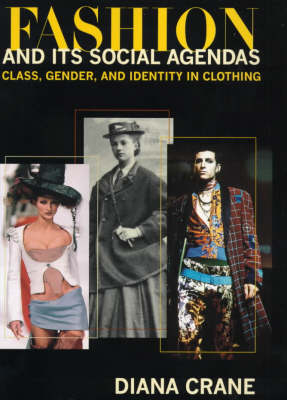
Fashion and Its Social Agendas
Class, Gender and Identity in Clothing
Seiten
2000
University of Chicago Press (Verlag)
978-0-226-11798-0 (ISBN)
University of Chicago Press (Verlag)
978-0-226-11798-0 (ISBN)
- Titel ist leider vergriffen;
keine Neuauflage - Artikel merken
It has long been said that clothes make the man (or woman), but is it still true? If so, how has the information clothes convey changed over the years? Using a wide range of historical and contemporary materials, the author demonstrates how the social significance of clothing has been transformed.
It has long been said that clothes make the man (or woman), but is it still true today? If so, how has the information clothes convey changed over the years? Using a wide range of historical and contemporary materials, Diana Crane demonstrates how the social significance of clothing has been transformed. Crane compares 19th-century societies - France and the United States - where social class was the most salient aspect of social identity signified in clothing with late 20th-century America, where lifestyle, gender, sexual orientation, age and ethnicity are more meaningful to individuals in constructing their wardrobes. Today, clothes worn at work signify social class, but leisure clothes convey meanings ranging from trite to political. In today's multicode societies, clothes inhibit as well as facilitate communication between highly fragmented social groups. Crane extends her comparison by showing how 19th-century French designers created fashions that suited lifestyles of Paris elites but that were also widely adopted outside France. By contrast, today's designers operate in a global marketplace, shaped by television, film and popular music.
No longer confined to elites, trendsetters are drawn from many social groups, and most trends have short trajectories. To assess the impact of fashion on women, Crane uses voices of college-aged and middle-aged women who took part in focus groups. These discussions yield fascinating information about women's perceptions of female identity and "Fashion and Its Social Agendas" stands out as a critical study of gender, fashion and consumer culture.
It has long been said that clothes make the man (or woman), but is it still true today? If so, how has the information clothes convey changed over the years? Using a wide range of historical and contemporary materials, Diana Crane demonstrates how the social significance of clothing has been transformed. Crane compares 19th-century societies - France and the United States - where social class was the most salient aspect of social identity signified in clothing with late 20th-century America, where lifestyle, gender, sexual orientation, age and ethnicity are more meaningful to individuals in constructing their wardrobes. Today, clothes worn at work signify social class, but leisure clothes convey meanings ranging from trite to political. In today's multicode societies, clothes inhibit as well as facilitate communication between highly fragmented social groups. Crane extends her comparison by showing how 19th-century French designers created fashions that suited lifestyles of Paris elites but that were also widely adopted outside France. By contrast, today's designers operate in a global marketplace, shaped by television, film and popular music.
No longer confined to elites, trendsetters are drawn from many social groups, and most trends have short trajectories. To assess the impact of fashion on women, Crane uses voices of college-aged and middle-aged women who took part in focus groups. These discussions yield fascinating information about women's perceptions of female identity and "Fashion and Its Social Agendas" stands out as a critical study of gender, fashion and consumer culture.
| Erscheint lt. Verlag | 4.9.2000 |
|---|---|
| Zusatzinfo | 55 halftones |
| Sprache | englisch |
| Maße | 159 x 235 mm |
| Gewicht | 638 g |
| Themenwelt | Kunst / Musik / Theater ► Design / Innenarchitektur / Mode |
| Geschichte ► Teilgebiete der Geschichte ► Kulturgeschichte | |
| Geschichte ► Teilgebiete der Geschichte ► Sozialgeschichte | |
| Sozialwissenschaften | |
| ISBN-10 | 0-226-11798-7 / 0226117987 |
| ISBN-13 | 978-0-226-11798-0 / 9780226117980 |
| Zustand | Neuware |
| Haben Sie eine Frage zum Produkt? |
Mehr entdecken
aus dem Bereich
aus dem Bereich
der stille Abschied vom bäuerlichen Leben in Deutschland
Buch | Hardcover (2023)
C.H.Beck (Verlag)
23,00 €
vom Mittelalter bis zur Gegenwart
Buch | Softcover (2024)
C.H.Beck (Verlag)
12,00 €
eine Geschichte der Welt in 99 Obsessionen
Buch | Hardcover (2023)
Klett-Cotta (Verlag)
22,00 €


